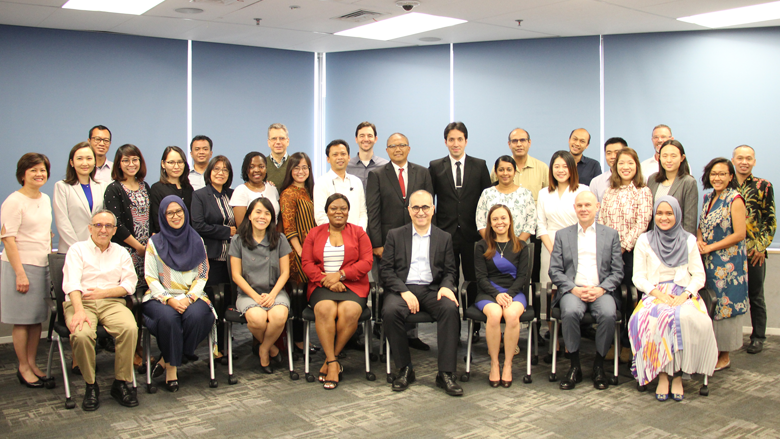The World Bank Treasury’s Public Debt Management Advisory team completed its inaugural Sovereign Balance Sheet Risk Management workshop in Jakarta, Indonesia, on February 22. This five-day innovative training built expertise and shared knowledge about sovereign balance sheet risk management with 27 practitioners from finance ministries and central banks from 12 countries. Using a framework that looks at a sovereign’s assets as well as liabilities, also known as the SALM framework, the workshop aimed to increase participants’ expertise in identifying, measuring and mitigating different types of risks, affecting both sides of a sovereign balance sheet. This workshop was developed and delivered under the Government Debt and Risk Management (GDRM) Program supported by the State Secretariat for Economic Affairs (SECO) of Switzerland.

“The course provided participating countries a different yet very important perspective on managing risks by considering the assets and liabilities of the entire public sector,” said Ms. Sharon P. Almanza, Deputy Treasurer of the Philippines, who attended the workshop. “Usually, countries only take into account one side of the balance sheet, particularly debt or borrowings. But the workshop stressed the importance of having a balance sheet risk management framework that integrates assets and liabilities–including contingent liabilities and consolidating the position of the entire public sector,” explained Ms. Almanza. “I learned the importance of really understanding and monitoring individual balance sheet risks, natural hedges, and the importance of proper coordination and communication among government entities.”
The workshop curriculum covered topics such as managing foreign currency risk, interest rate risk, liquidity risk, and credit risk using presentations from practitioners and case studies. It also provided a forum for candid exchanges and idea sharing among peers from across the world.
“In terms of learning, it was one of best workshops that I have ever attended,“ said Mr. Muhammad Umar Zahid, Market and Financial Risk Specialist in the Ministry of Finance of Pakistan.
Delivered by the World Bank Treasury, which manages portfolio of US$200 billion in debt and US$150 billion in assets
“This workshop is the first of its kind,” said M. Coşkun Cangöz, the Head of Debt and Risk Management at the World Bank Treasury. “The World Bank Treasury has been managing the International Bank for Reconstruction and Development’s (IBRD) balance sheet for more than 70 years; we have substantial experience and knowledge in asset and liability management and use the workshop’s consolidated approach in our own operations. Practitioner expertise and experience are this basis of the workshop and we augment them with country examples.”
The Sovereign Balance Sheet Risk Management workshop represents the latest addition to the workshop portfolio of the World Bank Treasury’s Public Debt Management Advisory team. These training modules also cover four other key pillars of public debt management: Designing Government Debt Management Strategies, Implementing Government Debt Management Strategies, Assessing and Managing Risks from Contingent Liabilities, and Cash Management.
In addition to these workshops, the team delivers on-site missions, knowledge products, webinars, seminars, forums, and peer group dialogues to help build the human capital of public debt and risk management officials worldwide.
Source: World Bank

